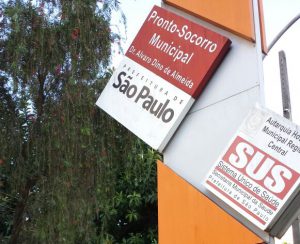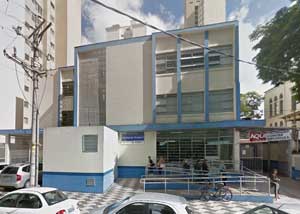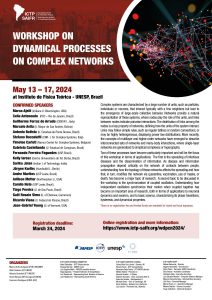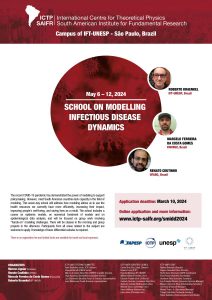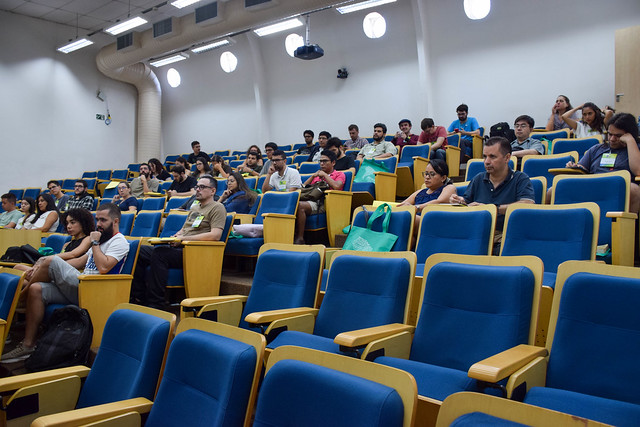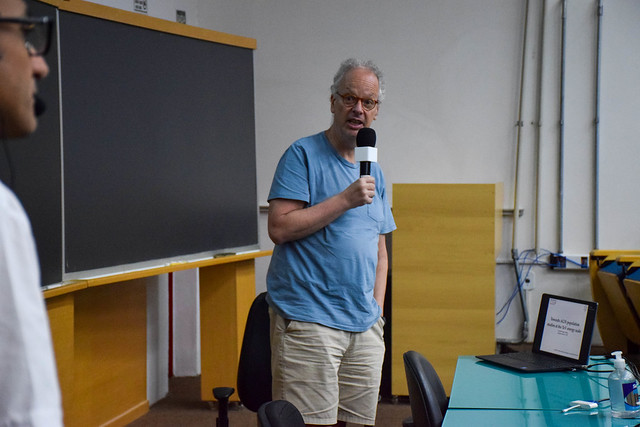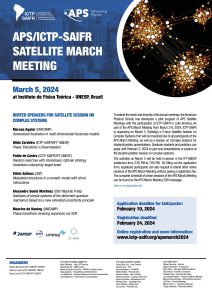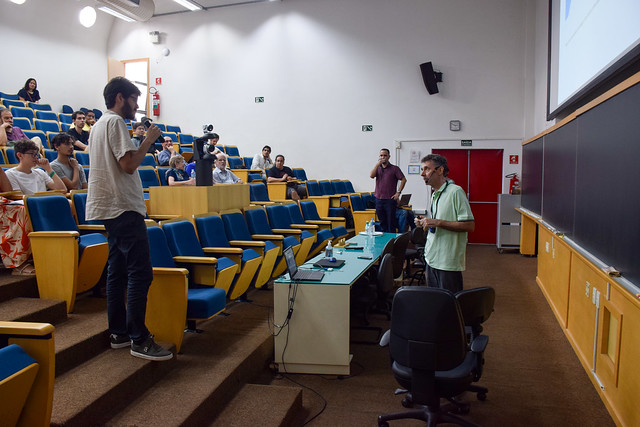Search Results
Health Information
Pronto Socorro Municipal Dr. Álvaro de Dino Almeida (Barra Funda)
AMA Especialidades Santa Cecilia
Continue Reading | Comments Off on Health Information
Eventos do ICTP-SAIFR abordam diversidade e inclusão na Física
“Increasing Diversity” teve foco em ações de desenvolvimento de carreira e “Boost STEM” apresentou iniciativas nacionais e internacionais
Por Felipe Saldanha (ICTP-SAIFR), com colaboração de Ana Clara Moreira (ICTP-SAIFR)*
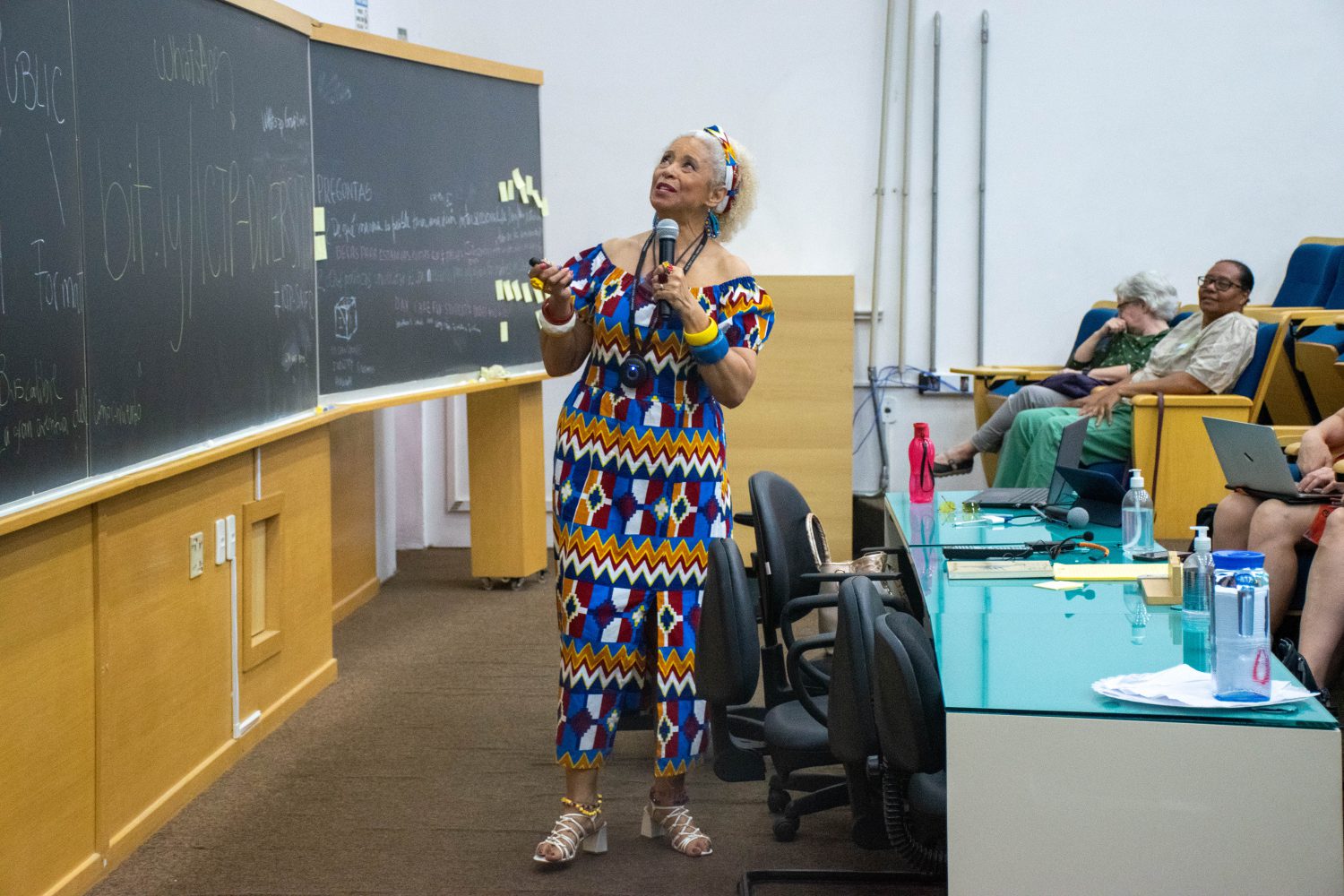
Na semana de 13 a 17 de novembro, o ICTP-SAIFR realizou dois workshops sobre diversidade e inclusão no Instituto de Física Teórica (IFT) da Unesp, na cidade de São Paulo. O primeiro foi o “Increasing Diversity and Inclusion in Science” (Aumentando a Diversidade e a Inclusão na Ciência), que teve o objetivo de fornecer ferramentas de apoio para as carreiras de alunos e jovens pesquisadores pertencentes a grupos com baixa representação. O segundo foi o “Proposals to Boost STEM Participation in Underrepresented Groups” (Propostas para Aumentar a Participação STEM de Grupos Sub-representados), com o intuito de discutir iniciativas no Brasil, Argentina e EUA que contribuem para aumentar a diversidade na ciência com foco nas populações afrodescendentes, indígenas e de baixa renda.
O primeiro evento teve palestras plenárias de pesquisadoras em diferentes estágios profissionais: Sendy Melissa Santos do Nascimento, da Universidade Federal de Alagoas (UFAL); Sônia Guimarães, do Instituto de Tecnologia Aeronáutica (ITA); e Renata Wasserman, da Universidade de São Paulo (USP). Sendy Nascimento falou sobre sua carreira e mulheres negras que a inspiram, como a matemática Katherine Johnson, uma das responsáveis pelo tráfego aéreo como se conhece hoje. Sônia Guimarães e Renata Wasserman explanaram sobre suas trajetórias profissionais nas suas instituições e as barreiras que enfrentam. Houve ainda dois painéis de discussão. O primeiro, intitulado “Inclusão e diversidade em Ciência e Tecnologia: uma iniciativa para igualdade e desenvolvimento”, teve mediação de Zélia Maria Da Costa Ludwig, da Universidade Federal de Juiz de Fora (UFJF), e o segundo teve como título “Gênero e transição tecnológica na América Latina” e como mediadora Alba Avila-Bernal, da Universidade dos Andes (Colômbia).
Também integrou a programação uma edição especial do Ciência no Cinema, com exibição do filme Estrelas Além do Tempo no Cine Belas Artes, no dia 14, seguida de debate com Zélia Ludwig, da UFJF. No debate, a professora comentou sobre meritocracia, as dificuldades que mulheres negras têm ao acessar espaços acadêmicos e como elas são silenciadas. Ela acrescentou: “Precisamos empoderar as mulheres para que elas possam acreditar que podem e conseguem, e precisamos fazer isso juntas”.
O primeiro dia do segundo evento, Boost STEM (sigla em inglês para Ciência, Tecnologia, Engenharia e Matemática), foi voltado a experiências internacionais. Young-Kee Kim, presidente eleita da Sociedade Americana de Física (APS), mostrou como a instituição tem trabalhado para aumentar a inclusão e abraçar diversas perspectivas. Silvina Ponce Dawson, presidente designada da União Internacional de Física Pura e Aplicada (IUPAP), falou sobre ações desta entidade para ampliar a inclusão e a diversidade na Física.
Jim Gates, ex-presidente da APS e ganhador da Medalha Nacional da Ciência dos EUA, ofereceu um relato de sua própria vida enquanto homem negro, mostrando como tem desafiado barreiras e vivido a diversidade em STEM. Por fim, Valeria Viva, cofundadora da XSTEM (Argentina), dissertou sobre como a sua organização tem aplicado a educação STEM para adolescentes. As discussões foram finalizadas com uma mesa-redonda com a participação dos palestrantes.
O segundo dia deu destaque a iniciativas brasileiras. Maria Lucia Santana Braga, analista e membro da equipe do Programa Mulher e Ciência do CNPq, apresentou o Painel de Fomento em Ciência, Tecnologia e Inovação, que consegue, pela primeira vez, detalhar com dados explícitos a proporção no Brasil dos gêneros e etnicidades nos vários níveis da carreira. Lazaro Cunha, diretor do Instituto Steve Biko e coordenador do Oguntec, explicou o funcionamento do projeto, uma experiência de ações afirmativas na educação científica de jovens negros de escolas públicas da Bahia. Rogerio Monteiro de Siqueira, da Escola de Artes, Ciências e Humanidades da USP, explanou sobre o programa de pós-doutorado para pesquisadores negros nesta universidade, e Celso Lins de Oliveira, da Faculdade de Zootecnia e Engenharia de Alimentos da USP, abordou as barreiras e a sub-representação negra na docência do Ensino Superior.
Na sequência, houve uma mesa-redonda com todos os palestrantes do dia, que incluiu também Rodrigo Barbosa Capaz, presidente da Sociedade Brasileira de Física (SBF), e Marcelo Knobel, ex-reitor da Universidade Estadual de Campinas (Unicamp). Capaz citou iniciativas da SBF como os prêmios Anselmo Salles Paschoa (outorgado a pessoas negras em início de carreira na pesquisa em Física) e Carolina Nemes (para mulheres físicas em início de carreira) e a Comissão JEDI – Justiça, Equidade, Diversidade e Inclusão, presidida por Sônia Guimarães. Knobel discutiu o Programa de Formação Interdisciplinar Superior (ProFIS), projeto que já preparou mais de mil estudantes de Ensino Médio, vindos de escolas públicas de Campinas, para ingressar na Unicamp.
“O Boost STEM foi um evento essencial para ouvir as demandas da comunidade e melhor planejar atividades futuras, com atenção especial aos grupos sub-representados como a população negra, o povo indígena, as pessoas de baixa renda, mulheres e outras identidades de gênero”, afirma Karen Hallberg, do Instituto Balseiro (Argentina), uma das organizadoras do evento e membro do conselho científico do ICTP-SAIFR. As gravações das transmissões ao vivo e materiais de apoio do Increasing Diversity e do Boost STEM estão disponíveis no site do ICTP-SAIFR.
*Felipe Saldanha e Ana Clara Moreira são bolsistas Fapesp de Jornalismo Científico no ICTP-SAIFR.
Continue Reading | Comments Off on Eventos do ICTP-SAIFR abordam diversidade e inclusão na Física
Escola prepara futuros líderes da pesquisa em Física
“Journeys”, curso do ICTP-SAIFR/IFT-Unesp com Instituto Perimeter (Canadá) para graduandos de alto desempenho, oferece formação de ponta, networking e a chance de cursar mestrado em conjunto com um instituto de excelência no exterior
Por Felipe Saldanha
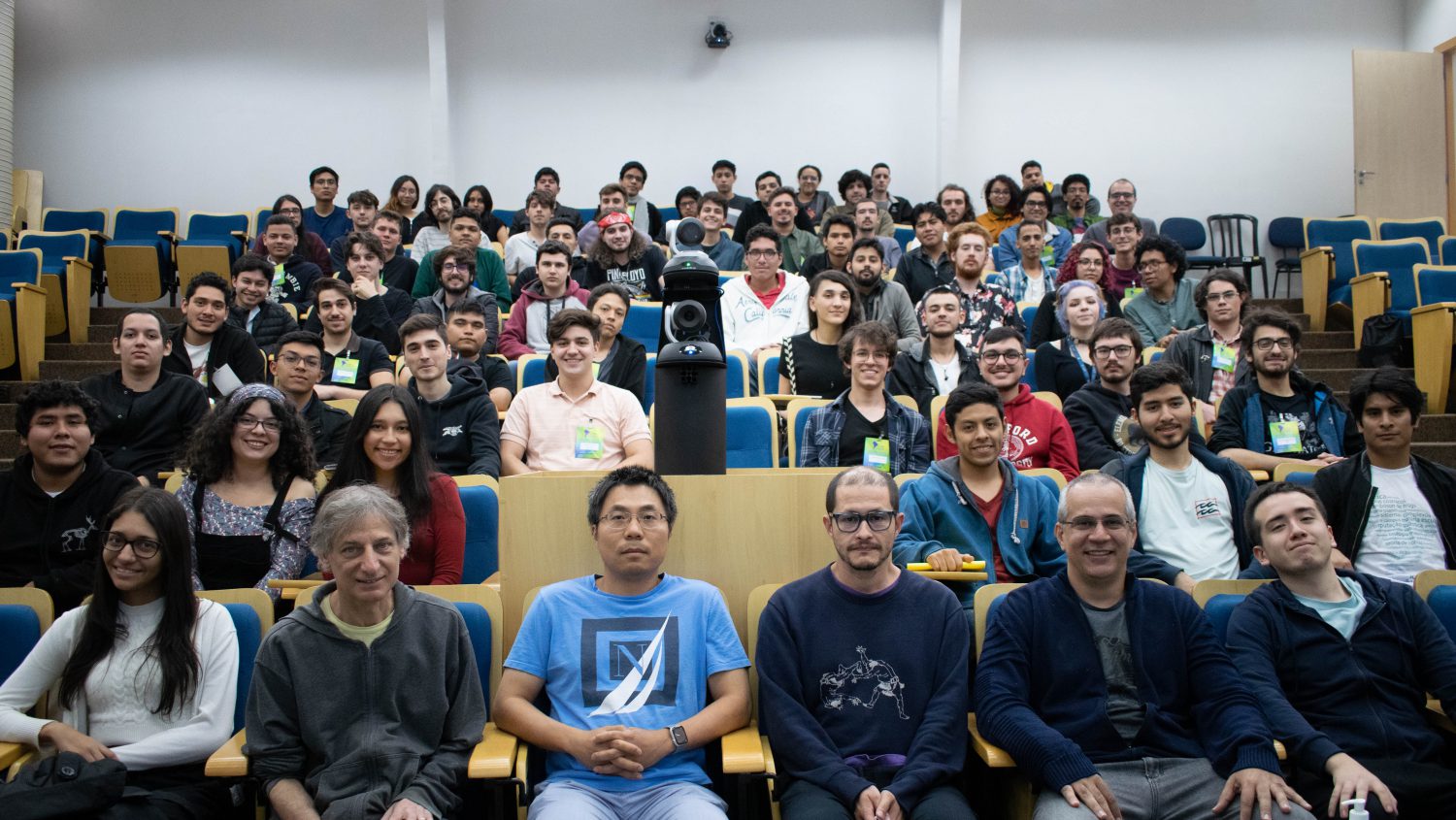
Neste exato momento, alguns dos pesquisadores em Física propensos a se tornarem os mais importantes da próxima geração ainda estão cursando a graduação. Para aumentar as chances de sucesso em suas carreiras, é preciso identificá-los, oferecer oportunidades de aperfeiçoamento e envolvê-los em colaborações internacionais. É com este intuito que, em julho, o ICTP-SAIFR, o Instituto de Física Teórica (IFT) da Unesp e o Instituto Perimeter de Física Teórica (Canadá) realizaram a sexta edição do Journeys into Theoretical Physics.
A origem do Journeys remete às Jornadas da Física Teórica, evento realizado pelo IFT-Unesp nas últimas três décadas como forma de divulgar os trabalhos desse instituto – cujos alunos são todos de pós-graduação – para estudantes de graduação de São Paulo. No formato atual, o propósito inicial foi expandido e, agora, o Journeys busca alcançar alunos de toda a América Latina, tendo como um dos principais atrativos a oportunidade de ingresso em um mestrado internacional conjunto entre ICTP-SAIFR/IFT-Unesp e Perimeter. As inscrições para a próxima edição têm abertura prevista para o início de 2024.
 O físico Pedro Vieira (foto à esquerda), coordenador da parceria Perimeter-SAIFR-IFT e professor em conjunto das duas instituições, explica que o Journeys procura alunos com desempenho excepcional em fim de curso e, por isso, impõe exigências desde o processo seletivo, que requer dos candidatos uma declaração de interesse, histórico escolar e cartas de recomendação de professores. Estudantes de fora da cidade de São Paulo podem solicitar ajuda de custo, que cobre hospedagem, transporte e alimentação.
O físico Pedro Vieira (foto à esquerda), coordenador da parceria Perimeter-SAIFR-IFT e professor em conjunto das duas instituições, explica que o Journeys procura alunos com desempenho excepcional em fim de curso e, por isso, impõe exigências desde o processo seletivo, que requer dos candidatos uma declaração de interesse, histórico escolar e cartas de recomendação de professores. Estudantes de fora da cidade de São Paulo podem solicitar ajuda de custo, que cobre hospedagem, transporte e alimentação.
A programação do Journeys, ofertada por professores do ICTP-SAIFR/IFT-Unesp e do Perimeter, cobre quatro tópicos de Física Teórica em nível básico, de modo um pouco menos avançado que as escolas tradicionalmente promovidas pelo ICTP-SAIFR, mas com temas que avançam o currículo da graduação (leia mais no box ao fim deste texto). Após cinco dias de palestras, os alunos são submetidos a dois dias de rigorosos exames escritos, que funcionam tanto como ferramenta de aprendizado quanto mecanismo de seleção para o mestrado internacional. Em 2023, os selecionados para esse mestrado foram Francisco Divi, do Instituto Balseiro, na Argentina; Matheus Balisa Pauliquevis, do Instituto de Física da Universidade de São Paulo (IFUSP); e Levy Bruno do Nascimento Batista, do Instituto de Física de São Carlos (IFSC/USP).
Para Vieira, o Journeys amplifica o “grau da colaboração” entre ICTP-SAIFR/IFT-Unesp e Perimeter ao ir além de um simples memorando de entendimento e proporcionar a formação de uma “massa crítica”. Ele ainda destaca que o Journeys proporciona vantagens para todos os envolvidos. Para o ICTP-SAIFR/IFT-Unesp, por atrair “esses alunos que seria muito difícil atrair de outra forma, que são de fato de topo e iriam para outras universidades de topo”. Para o Perimeter, que recebe estudantes que costumam ficar entre os melhores da instituição canadense. E para os próprios alunos, que “não têm acesso a nenhum mecanismo para se distinguirem como têm nesta escola”.
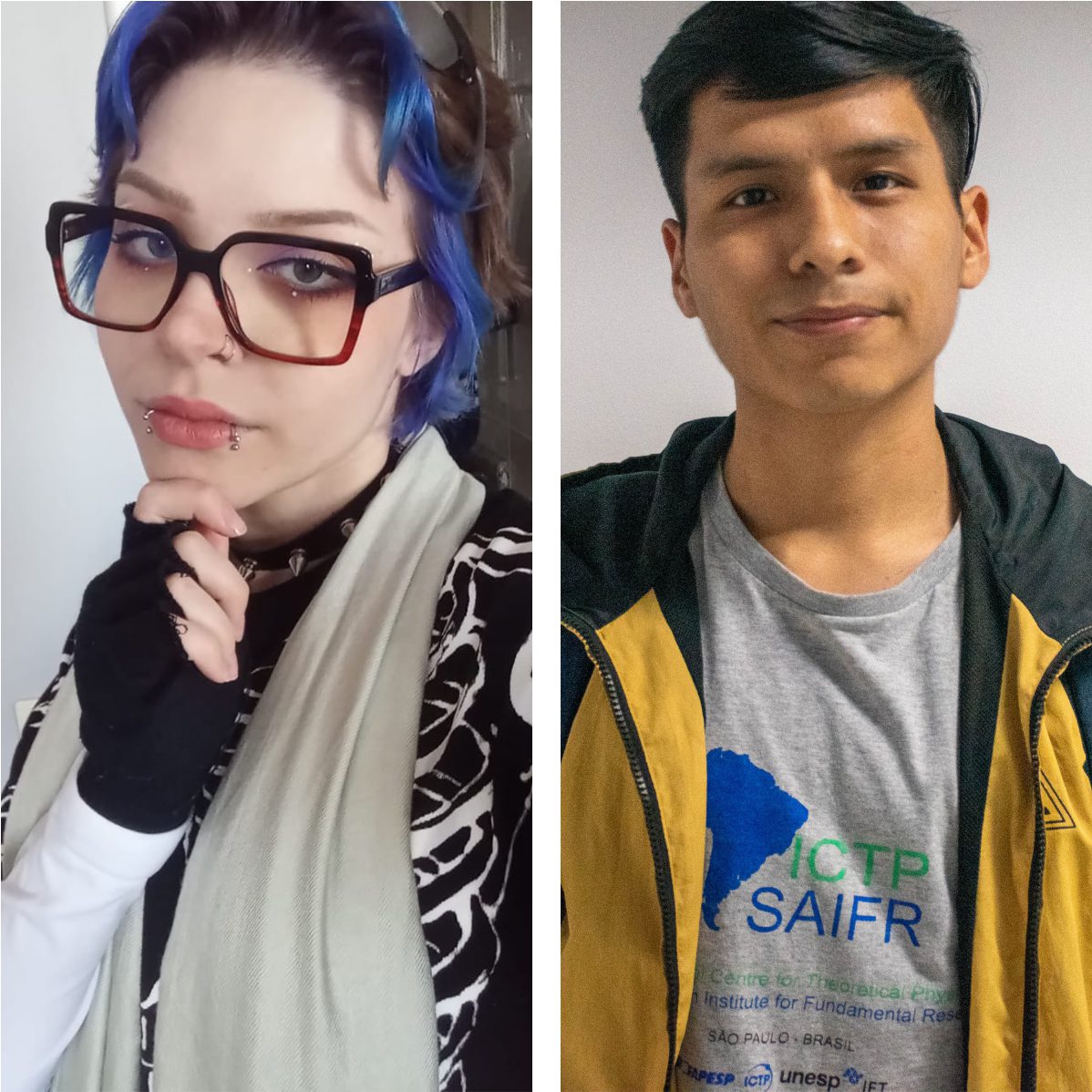
Lua Figueiredo (esq.) e Dario Escriba (dir.): alunos do Journeys fazem networking e se aprofundam em tópicos diversos
O Journeys é igualmente uma oportunidade de fazer networking. Vieira conta que os alunos são encorajados a “ir bater à porta das pessoas enquanto aqui estão para descobrir potenciais supervisores para o futuro”. Aproximar-se de professores reconhecidos na área, do Brasil e da América Latina, foi justamente um dos motivos para a graduanda do IFUSP Lua Figueiredo ter optado por participar da escola por dois anos consecutivos. Ela ainda aproveitou o evento para se aprofundar em matérias com as quais não é tão familiarizada e “ver o que se faz nas outras áreas”.
Motivos semelhantes trouxeram ao Journeys, também pela segunda vez, o graduando Dario Escriba, da Universidade Nacional Maior de São Marcos (Peru). Ele afirma que os tópicos abordados na escola não costumam ser discutidos nos países em desenvolvimento. O estudante considerou o conteúdo como denso e difícil de “resumir e revisar” em poucas horas de aula, mas apontou como “muito útil” a disponibilização das gravações no YouTube.
Vieira aponta que o Journeys estabelece “uma noção de grupo entre os alunos, porque serão os futuros líderes da Física da América Latina” e muitas vezes vão se conhecer pela primeira vez no evento, o que “vai certamente ter um impacto no futuro, de criar um sentido de comunidade e um sentido de colaboração”. Assim, é possível que estudantes como Figueiredo e Escriba se tornem, dentro de alguns anos, coordenadores de algumas das escolas avançadas do ICTP-SAIFR.
Felipe Saldanha é jornalista de ciência do ICTP-SAIFR com bolsa Fapesp.
INTRODUÇÕES E APROFUNDAMENTOS
Tópicos abordados na escola unem o básico às discussões mais contemporâneas da Física Teórica
Introdução à supersimetria
Nathan Berkovits, ICTP-SAIFR / IFT-Unesp
Formulada há 50 anos como uma generalização das simetrias de espaço-tempo, mas com novas coordenadas para além das quatro mais conhecidas (as três dimensões espaciais e uma temporal), a supersimetria – aplicada à gravidade – “parece ser a única maneira para unificar a Relatividade Geral com Mecânica Quântica sem encontrar inconsistências”, aponta Berkovits. “Mas, até agora, os experimentos não encontraram evidências para essa nova simetria. Então ainda está incerto se a supersimetria vai ser relevante para entender a Física do nosso universo”.
Aprendizado de máquina para matéria quântica
Juan Carrasquilla, Instituto Vector para Inteligência Artificial (Canadá)
Avanços na inteligência artificial (IA) estão revolucionando as ciências da natureza em geral e a Física em particular, com ferramentas para facilitar a compreensão de fenômenos naturais mais precisas que as técnicas tradicionais. No caso específico da matéria quântica, “a IA desempenha um papel fundamental no tratamento de grandes volumes de dados por meio do reconhecimento de padrões, produzindo insights mais profundos a partir de dados experimentais de imagens eletrônicas”, explica Carrasquilla. Para o pesquisador, a união entre IA e Física “abre novos caminhos de exploração, permitindo-nos enfrentar problemas complexos de forma mais eficiente”.
Introdução ao efeito Hall quântico
Yin-Chen He, Instituto Perimeter de Física Teórica (Canadá)
“O efeito Hall quântico é um belo exemplo de como os sistemas do mundo real podem exibir fenômenos quânticos notáveis em escala macroscópica, contrastando com o reino microscópico usual onde ocorrem fenômenos quânticos”, diz He. De acordo com o pesquisador, este efeito está envolvido em ideias e subcampos de Física e Matemática que estão na vanguarda da pesquisa. Entre as suas potenciais aplicações tecnológicas, está “a construção de computadores quânticos livres de erros, conhecidos como computadores quânticos topológicos. Este campo ainda é uma área de pesquisa ativa e contínua”, conclui He.
Problemas em aberto na Física de Partículas
Ricardo Matheus, IFT-Unesp
Neste curso, Matheus parte de algo bem estabelecido na Física, o modelo padrão, que combina dois dos pilares fundamentais da Física contemporânea – a quântica e a relatividade – para descrever “não somente as partículas subatômicas (de que tudo que vemos é feito) mas também suas interações, dando assim conta das três forças fundamentais que importam neste mundo pequenino”. A partir daí, segundo o pesquisador, “podemos discutir também tudo aquilo que ele não explica: a massa dos neutrinos e a matéria escura, ambos problemas ainda sem solução”.
Continue Reading | Comments Off on Escola prepara futuros líderes da pesquisa em Física
Workshop on Dynamical Processes on Complex Networks

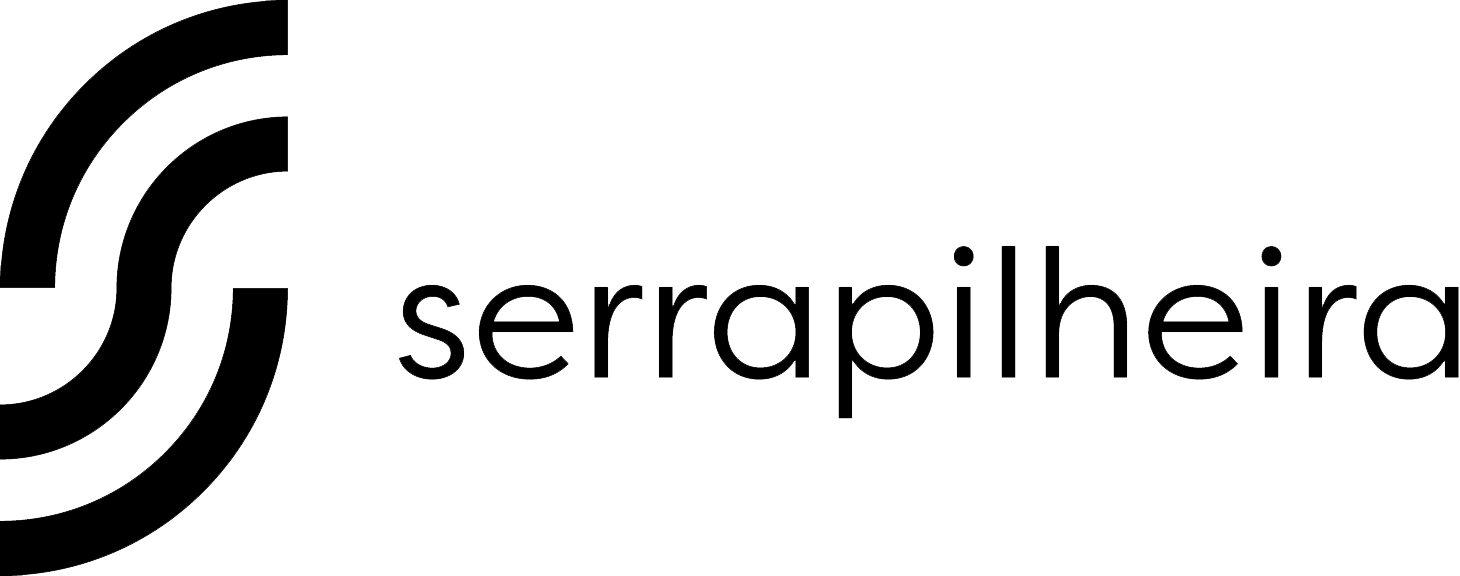
May 13 – 17, 2024
ICTP-SAIFR, São Paulo, Brazil
IFT-UNESP Auditorium
Home
Complex systems are characterized by a large number of units, such as particles, individuals or neurons, that interact typically with a few neighbors but lead to the emergence of large-scale collective behavior. Examples include swarms of birds, the spreading of infectious diseases, the transmission of electric impulses by neurons, and the synchronization of fireflies at nightfall. Networks provide a natural representation of these systems, where nodes play the role of the units, and links between nodes indicate pairwise interactions. The distribution of links among the nodes is a key property of networks, defining how the units of the system interact. Links may follow simple rules, such as regular lattices or random connections, or may be highly heterogeneous, displaying power law distributions. More recently, the concepts of multilayer and higher-order networks have emerged to describe interconnected sets of networks and many-body interactions, where single-layer networks are generalized to simplicial complexes or hypergraphs.
Two of these processes have become particularly important and will be the focus of this workshop in terms of applications. The first is the spreading of infectious diseases and the dissemination of information. As disease and information propagation depend critically on the network of contacts between people, understanding how the topology of these networks affects the spreading and how that, in turn, modifies the network via quarantine, vaccination, use of masks, or death, has become a major topic of research. A second topic to be discussed in the workshop is the synchronization of coupled oscillators. Understanding how independent oscillators synchronize their motion when coupled together has become an important area of research, both in terms of applications to neuronal dynamics and swarms, and to basic science, characterizing its phase transitions, hysteresis, and dynamical properties. We will also devote time to discussing the structure of higher-order representations of real systems and what changes they induce in the outcomes of the previous dynamical processes.
There is no registration fee and limited funds are available for local expenses.
- Marcus A.M. de Aguiar (IFGW-UNICAMP)
- Hilda Cerdeira (IFT-UNESP)
- Roberto Kraenkel (IFT-UNESP)
- Yamir Moreno (BIFI-Zaragoza/CENTAI)
- Francisco Rodrigues (ICMC-USP)
List of participants: Updated on May 21, 2024.
Survey: HERE
Invited Speakers
Confirmed Speakers:
- Marco Ajelli (Indiana University Bloomington, USA): Computational tools to respond to health emergencies
- Celia Anteneodo (PUC – Rio de Janeiro, Brazil): Opinion dynamics in complex networks
- Guilherme Ferraz de Arruda (CENTAI Institute, Italy): Contagion models on higher-order networks
- Marcelo Avila (Universidad Mayor de San Andrés, Bolivia): Firefly flashing behavior as a paradigmatic example of synchronization in complex networks: from simple inevitable sync to mobile oscillators
- Antonio Batista (Universidade Estadual de Ponta Grossa, Brazil): Chimera states in neuronal networks
- Jose Antonio Mendez-Bermúdez (Universidad Autónoma de Puebla, Mexico): "Scaling properties of directed multilayer random networks: A Random Matrix Theory approach"
- Stefano Boccaletti (CNR- Institute for Complex Systems, Italy): Describing the transition to synchronization of networked systems: revealing (and controlling) clusters and modular behavior
- Timoteo Carletti (Namur Institute for Complex Systems, Belgium): Global Synchronization on networks and beyond
- Gabriela Castellano (Universidade Estadual de Campinas, Brazil): Complex networks to understand brain re/organization in motor rehabilitation and brain-computer interfaces
- Fernando Ferreira Fagundes (USP, Brazil): Exploring Networks in Modeling Complex Systems:
Examples in Economic and Agricultural Systems - Kelly Iarosz (Centro Universitário de Tel. Borba, Brazil): Plasticity: an incredible brain capacity
- Sarika Jalan (Indian Institule of Technology, India): Phase oscillators with higher order interactions: rotating clusters
- Alberto Aleta (University of Zaragoza, Spain): The unequal effects of the health-economy tradeoff during the COVID-19 pandemic
- Andre Martins (USP Leste, Brazil): The coevolution of opinions and networks
- Adilson Motter (Northwesten University, USA): Complex Contagion: Unfolding and Control
- Camilo Neto (USP Leste, Brazil): Structure and robustness of Sao Paulo public transport network
- Tiago Pereira (Universidade de Sao Paulo, Brazil): Emergent chaos in the Turing-Smale problem
- Gaël Rosain Simo (University of Ebolowa, Cameroon): Collective behaviors in neuronal networks under the actions of electric and magnetic fields
- Ricardo Viana (Universidade Federal do Parana, Brazil): Phase and frequency synchronization of nonlocally coupled oscillators
- Jean-Gabriel Young (University of Vermont, USA): Complex or simple? Determining a contagion’s type from observational data.
Abstracts: HERE
Short Talks
Monday 11:30 – 12:00
Kishore Dutta (Handique Girls’ College Guwahati, India): Evolving networks for realization of cultural evolution.
Fernando da Silva (State University of New York, USA): Self-sustained activity and intermittent synchronization in balanced networks.
Monday 17:00 – 17:30
Pablo Padilla (Institute for Applied Mathematics UNAM, Mexico): Understanding musical style with complex networks.
Guilherme Costa (ICTP-SAIFR / IFT-UNESP, Brazil): The influence of external drives on the frustrated Kuramoto model.
Rodrigo da Motta (UFABC, Brazil): A novel method to investigate neurodevelopment using Ising temperature and graph neural networks.
Bruno Rafael R. Boaretto (Unifesp, Brazil): Emergence of phase synchronization in sparse neuronal networks under Poissonian spike inputs.
Tuesday 11:30 – 12:00
João Lizárraga (UNICAMP, Brazil): Active and chaotic swarmalators.
Matheus Palmero (IFUSP, Brazil): Recurrent chaotic trajectories in a time-dependent potential well model.
Tuesday 17:00 – 17:30
Juliane Teixeira (UFV, Brazil): Visibility graphs for non-equilibrium phase transitions.
Thomas Peron (ICMC-USP, Brazil): Synchronization in high dimensions: mean-field theory of vector spin models on networks with arbitrary degree distributions.
Rodrigo Malavazi (USP, Brazil): The spark of synchronization in heterogeneous networks of chaotic maps.
Paulo Cesar Ventura (Indiana University, USA): Combining within and between-host epidemic dynamics in a multiplex synthetic population.
Thursday 11:30 – 12:00
Federico Sevlever (INEU – Fleni – CONICET, Argentina): Defining network topologies that can achieve molecular memory.
Leonardo dos Santos (UFRGS, Brazil): A random matrix model for the stability of heterogeneous Ornstein-Uhlenbeck processes on top of highly connected networks.
Friday 11:30 – 12:15
Dario Agudelo (Universidad Autónoma de Manizales, Colombia): Analysis of dynamic networks based on the Ising model for the case of study of co-authorship of scientific articles
Gabriel Marghoti (UFPR, Brazil): Beat frequency induced transitions in synchronization dynamics.
Emanuel Teixeira (UFRGS, Brazil): A single active ring model with velocity self-alignment.
Format: 15 min
Abstracts: HERE
Posters
- Noris Melis de la Cruz (INFAP-UNSL, Argentina): Standard and inverse site percolation of triangular tiles on triangular lattices: Isotropic and perfectly oriented deposition and removal.
- Ricardo Tetti Camacho (ICMC/USP, Brazil): Epidemic processes of a system of mobile agents in a heterogeneous landscape.
- Luiza Lober de Souza Piva (USP, Brazil): Discovering rumor propagation dynamics through regression techniques.
- Victor Sanchez (Unicamp, Brazil): Global properties of the human brain at rest collected with near-infrared spectroscopy.
- Lucas De Lazari E Ferreira (IGCE-UNESP, Brazil): Characterization of basins of attraction in 1D models and the extrapolation for higher dimension.
- Eric Rozán (Balseiro Institute, Argentina): Testing lockdown measures in epidemic outbreaks through mean-field models considering the social structure.
- Hugo Pereira Maia (UFV, Brazil): Polarization and radicalization dynamics: Hyperpartisanship and echo-chamber effects in brazilian political networks.
- Armando José Gomes Abrantes Ferreira (PPgEE/UFCG, Brazil): Investigation of the role of the coupling function in the synchronization a system of two coupled oscillators with application to the design of a Pre-synchronization Strategy for Grid-Forming Inverters.
- Lucas Eduardo (UEPG, Brazil): The roles of Potassium and Calcium Currents in a Neuronal Network.
- Diogo Leonai Souza (UEPG, Brazil): Spontaneous spiral waves in a neuronal network.
- Vitor Hugo (UFPR, Brazil): Epidemiological model based on networks with non-local coupling.
- Paulo Ricardo Protachevicz (USP, Brazil): How synchronized firing patterns emerge and shape neuronal network connectivity.
- Norma Valencio (UFSCar/DCAM): Achievement of the Sustainable Development Goals in the context of dealing with Disasters: sociological analysis based on the use of ML algorithms.
Participants MUST BRING THE BANNER PRINTED.
For details about the poster presentation please look at the correspondent Additional Information topic.
Registration
Program
Videos and Files
-
10:00 - Adilson Motter (Indiana University Bloomington, USA):
Computational tools to respond to health emergencies
- 11:00 - Fernando da Silva (State University of New York, USA): Self-sustained activity and intermittent synchronization in balanced networks.
-
11:30 - Bruno Rafael R. Boaretto (Unifesp, Brazil):
Emergence of phase synchronization in sparse neuronal networks under Poissonian spike inputs.
- 12:00 - Andre Martins (USP Leste, Brazil): The coevolution of opinions and networks
- 14:30 - Kelly Iarosz (UNIFATEB Centro Universitário de Telêmaco Borba, Brazil): Plasticity: an incredible brain capacity
- 16:00 - Guilherme Ferraz de Arruda (CENTAI Institute, Italy): Contagion models on higher-order networks
- 17:00 - Guilherme Costa (ICTP-SAIFR / IFT-UNESP, Brazil): The influence of external drives on the frustrated Kuramoto model
-
17:15 - Emanuel Teixeira (UFRGS, Brazil):
A single active ring model with velocity self-alignment
-
10:00 - Tiago Pereira (Universidade de Sao Paulo, Brazil):
Coherence Resonance in Influencer Networks
-
11:30 - João Lizárraga (UNICAMP, Brazil):
Active and chaotic swarmalators
-
11:45 - Matheus Palmero (IFUSP, Brazil):
Recurrent chaotic trajectories in a time-dependent potential well model
- 14:00 - Ricardo Viana (Universidade Federal do Parana, Brazil): Phase and frequency synchronization of nonlocally coupled oscillators
- 14:30 - Gaël Rosain Simo (University of Ebolowa, Cameroon): Collective behaviors in neuronal networks under the actions of electric and magnetic fields
-
16:00 - Stefano Boccaletti (CNR- Institute for Complex Systems, Italy):
Describing the transition to synchronization of networked systems: revealing (and controlling) clusters and modular behavior
- 17:00 - Juliane Teixeira (UFV, Brazil): Visibility graphs for non-equilibrium phase transitions
-
17:15 - Thomas Peron (ICMC-USP, Brazil):
Synchronization in high dimensions: mean-field theory of vector spin models on networks with arbitrary degree distributions.
-
17:30 - Paulo Cesar Ventura (Indiana University, USA):
Combining within and between-host epidemic dynamics in a multiplex synthetic population
-
10:00 - Jose Antonio Mendez-Bermúdez (Universidad Autónoma de Puebla, Mexico):
"Scaling properties of directed multilayer random networks: A Random Matrix Theory approach"
-
11:30 - Camilo Neto (USP Leste, Brazil):
Structure and robustness of Sao Paulo public transport network
- 12:30 - Rodrigo Malavazi (USP, Brazil): The spark of synchronization in heterogeneous networks of chaotic maps.
- 14:00 - Timoteo Carletti (University of Namur, Belgium): Turing patterns on networks and beyond
- 16:00 - Gabriela Castellano (Universidade Estadual de Campinas, Brazil): Complex networks to understand brain re/organization in motor rehabilitation and brain-computer interfaces
-
10:00 - Marcelo Avila (Universidad Mayor de San Andrés, Bolivia):
Firefly flashing behavior as a paradigmatic example of synchronization in complex networks: from simple inevitable sync to mobile oscillators
- 11:30 - Antonio Batista (Universidade Estadual de Ponta Grossa, Brazil): Chimera states in neuronal networks
-
12:30 - Federico Sevlever (INEU – Fleni – CONICET, Argentina):
Defining network topologies that can achieve molecular memory
-
14:30 - Sarika Jalan (Indian Institule of Technology, India):
Phase oscillators with higher order interactions: rotating clusters
-
16:00 - Marco Ajelli (Indiana University Bloomington, USA):
Computational tools to respond to health emergencies
-
17:00 - Alberto Aleta (University of Zaragoza, Spain):
The unequal effects of the health-economy tradeoff during the COVID-19 pandemic
-
10:00 - Jean-Gabriel Young (University of Vermont, USA):
Complex or simple? Determining a contagion’s type from observational data
- 11:30 - Celia Anteneodo (PUC – Rio de Janeiro, Brazil): Opinion dynamics in complex networks
-
12:30 - Dario Agudelo (Universidad Autónoma de Manizales, Colombia):
Analysis of dynamic networks based on the Ising model for the case of study of co-authorship of scientific articles
-
12:45 - Gabriel Marghoti (UFPR, Brazil):
Beat frequency induced transitions in synchronization dynamics.
-
14:30 - Timoteo Carletti (Namur Institute for Complex Systems, Belgium):
Global Synchronization on networks and beyond
asdasdasd
Photos
Additional Information
Attention! Some participants in ICTP-SAIFR activities have received email from fake travel agencies asking for credit card information. All communication with participants will be made by ICTP-SAIFR staff using an e-mail “@ictp-saifr.org”. We will not send any mailings about accommodation that require a credit card number or any sort of deposit.
BOARDING PASS: All participants, whose travel has been provided or will be reimbursed by ICTP-SAIFR, should bring the boarding pass upon registration. The return boarding pass (PDF, if online check-in, scan or picture, if physical) should be sent to secretary@ictp-saifr.org by e-mail.
COVID-19: Brazilians and foreigners no longer have to present proof of vaccination before entering the country.
Visa information: Nationals from several countries in Latin America and Europe are exempt from tourist visa. Nationals from Australia, Canada and USA are exempt from tourist visa until April 10, 2025. Please check here which nationals need a tourist visa to enter Brazil.
Accommodation: Participants, whose accommodation will be provided by the institute, will stay at The Universe Flat. Hotel recommendations are available here.
How to reach the Institute: The school will be held at ICTP South American Institute, located at IFT-UNESP, which is across the street from a major bus and subway terminal (Terminal Barra Funda). The address which is closer to the entrance of the IFT-UNESP building is R. Jornalista Aloysio Biondi, 120 – Barra Funda, São Paulo. The easiest way to reach us is by subway or bus, please find instructions here.
Poster presentation: Participants who are presenting a poster MUST BRING A PRINTED BANNER . The banner size should be at most 1 m (width) x 1,5 m (length). We do not accept A4 or A3 paper. Click here to see what a banner looks like: http://designplast.ind.br/produtos/detalhe/impressao-digital/banner/119/9
Continue Reading |
Comments Off on
School on Modelling Infectious Disease Dynamics


May 6 – 12, 2024
ICTP-SAIFR, São Paulo, Brazil
IFT-UNESP Auditorium
Home
The recent COVID-19 pandemic has demonstrated the power of modeling to support policymaking. However, most South American countries lack capacity in the field of modeling. This seven-day school will address how modeling allows us to use the health resources we currently have more efficiently, increasing their impact, improving people’s well-being, and saving lives as a result. The school includes a course on epidemic models, on numerical treatment of models and on epidemiological data analysis, and will be focused on group work involving “hands-on” modeling challenges. There will be classes in the morning and group projects in the afternoon. Participants from all areas related to the subject are welcome to apply. Knowledge of basic differential calculus is required.
There is no registration fee and limited funds are available for travel and local expenses.
Organizers:
- Marcus Aguiar (Unicamp)
- Renato Coutinho (UFABC)
- Marcelo Ferreira da Costa Gomes (Fiocruz/RJ)
- Roberto Kraenkel (IFT-UNESP)
List of participants: Updated on May 08, 2024.
Survery: HERE
Lecturers
Lecturers:
- Roberto Kraenkel (IFT-UNESP): Compartmental Models for Infectious Disease Dynamics
- Marcelo Ferreira da Costa Gomes (Fiocruz/RJ): Epidemiological Data Analysis
- Renato Coutinho (UFABC): Numerical Methods
- Guillaume Le Treut (Chan Zuckerberg Biohub, San Francisco): Dealing with Complexity in Epidemiological Models
Registration
Program
PDF version: Updated – April 26
Videos and Files
-
09:00 - Roberto Kraenkel (IFT-UNESP):
Compartmental Models for Infectious Disease Dynamics - Class 1 of 4
-
11:00 - Roberto Kraenkel (IFT-UNESP):
Compartmental Models for Infectious Disease Dynamics - Class 2 of 4
- 14:00 - Renato Coutinho (UFABC): Numerical Methods - Class 1 of 4
- 16:00 - Marcelo Ferreira da Costa Gomes (Fiocruz/RJ): Epidemiological Data Analysis - Class 1 of 4
- 09:00 - Renato Coutinho (UFABC): Numerical Methods - Class 2 of 4
- 11:00 - Marcelo Ferreira da Costa Gomes (Fiocruz/RJ): Epidemiological Data Analysis - Class 2 of 4
-
09:00 - Roberto Kraenkel (IFT-UNESP):
Compartmental Models for Infectious Disease Dynamics - Class 3 of 4
- 11:00 - Renato Coutinho (UFABC): Numerical Methods - Class 3 of 4
- 14:00 - Guillaume Le Treut (Chan Zuckerberg Biohub, San Francisco): Generating transition paths with Markov bridges and its application to cell-fate choice" and the abstract follows below
- 09:00 - Marcelo Ferreira da Costa Gomes (Fiocruz/RJ): Epidemiological Data Analysis - Class 3 of 4
-
11:00 - Guillaume Le Treut (Chan Zuckerberg Biohub, San Francisco):
Dealing with complexity in epidemiological models - Class 1 of 2
- 09:00 - Marcelo Ferreira da Costa Gomes (Fiocruz/RJ): Epidemiological Data Analysis - Class 4 of 4
-
11:00 - Guillaume Le Treut (Chan Zuckerberg Biohub, San Francisco):
Dealing with complexity in epidemiological models - Class 2 of 2
-
09:00 - Roberto Kraenkel (IFT-UNESP):
Compartmental Models for Infectious Disease Dynamics - Class 4 of 4
- 11:00 - Renato Coutinho (UFABC): Numerical Methods - Class 4 of 4
-
09:00 - ICTP-SAIFR (ICTP - SAIFR):
Group Presentations
asdasdasd
Photos
Additional Information
Registration: ALL participants should register. The registration will be on May 6 (Monday) from 8:00:hh AM to 9:00 AM on the 4th floor of the IFT-Unesp Building. See arrival instructions: here.
BOARDING PASS: All participants, whose travel has been provided or will be reimbursed by ICTP-SAIFR, should bring the boarding pass upon registration. The return boarding pass (PDF, if online check-in, scan or picture, if physical) should be sent to secretary@ictp-saifr.org by e-mail.
COVID-19: Brazilians and foreigners no longer have to present proof of vaccination before entering the country.
Visa information: Nationals from several countries in Latin America and Europe are exempt from tourist visa. Nationals from Australia, Canada and USA are exempt from tourist visa until April 10, 2024. Please check here which nationals need a tourist visa to enter Brazil.
Accommodation: Participants, whose accommodation will be provided by the institute, will stay at The Universe Flat. Hotel recommendations are available here.
How to reach the Institute: The school will be held at ICTP South American Institute, located at IFT-UNESP, which is across the street from a major bus and subway terminal (Terminal Barra Funda). The address which is closer to the entrance of the IFT-UNESP building is R. Jornalista Aloysio Biondi, 120 – Barra Funda, São Paulo. The easiest way to reach us is by subway or bus, please find instructions here.
Continue Reading |
Comments Off on
APS/ICTP-SAIFR Satellite April Meeting
April 5, 2024
ICTP-SAIFR, São Paulo, Brazil
Auditorium of IFT-UNESP
Home
To extend the reach and diversity of its annual meetings, the American Physical Society has developed a pilot program of APS Satellite Meetings with the participation of ICTP-SAIFR in Latin America. As part of the APS April Meeting from April 3-6, 2024, ICTP-SAIFR is organizing on April 5 (Friday) a 2-hour Satellite Session on Cosmology and related topics that will be broadcast live to all participants of the APS April Meeting, as well as a session for student/postdoc presentations.
Graduate students and postdocs can apply until March 20, 2024 to give oral presentations or posters at the student-postdoc session on Cosmology and related topics.
The activities on April 5 will be held in-person in the IFT-UNESP auditorium from 3 PM to 7 PM. The complete schedule of sessions of the APS Virtual March Meeting can be found on the APS April Meeting 2024 webpage.
There is no registration fee for participation in the APS/ICTP-SAIFR Satellite Meeting.
APS/ICTP-SAIFR Satellite April Meeting schedule:
Friday, April 5
15:00-17:00: Satellite Session on Cosmology and related topics
17:00-17:30: Coffee break
17:30-19:00: Student-Postdoc Presentations on Cosmology and related topics
Invited Speakers
Satellite Session on Cosmology and related topics
15:00 – Raul Abramo (IF-USP): Cosmology in the era of Machine Learning
15:30 – Riccardo Sturani (IFT-UNESP/ICTP-SAIFR): Ward identities in Gravitational Wave Astronomy
16:00 – Chee Sheng Fong (UFABC): How to verify high scale baryogenesis models?
16:30 – Edivaldo Moura Santos (IF-USP): Towards AGN population studies at the TeV energy scale
Abstracts: HERE
Student-Postdoc Presentations
Student-Postdoc Presentations on Cosmology and related topics
17:30 – João Victor Silva Rebouças (Insituto de Física Teórica – UNESP): Modelling the Nonlinear Power Spectrum with COLA Simulations
17:50 – Walter Riquelme (Instituto de Física Teórica – UAM/CSIC): Primordial non-Gaussianity with the Dark Energy Survey
18:10 – RODRIGO VOIVODIC (Donotia International Physics Center): The Hybrid Lagrangian Bias Expansion
18:20 – Lucas James Faga (Institute of Physics – University of São Paulo): Dark Energy Survey Year 3 Results: Cosmology from galaxy clustering and galaxy-galaxy lensing in harmonic space
Abstracts: HERE
Videos and Files
-
15:00 - ICTP-SAIFR (ICTP - SAIFR):
APS/ICTP-SAIFR Satellite April Meeting
asdasdasd
Photos
Additional Information
Poster presentation: Participants who are presenting a poster MUST BRING A PRINTED BANNER. The banner size should be at most 1 m (width) x 1,5 m (length). We do not accept A4 or A3 paper. Click here to see what a banner looks like: http://designplast.ind.br/produtos/detalhe/impressao-digital/banner/119/9
How to reach the Institute: The program will be held at ICTP South American Institute, located at IFT-UNESP, which is across the street from a major bus and subway terminal (Terminal Barra Funda). The address which is closer to the entrance of the IFT-UNESP building is R. Jornalista Aloysio Biondi, 120 – Barra Funda, São Paulo. The easiest way to reach us is by subway or bus, please find instructions here.
Continue Reading |
Comments Off on
APS/ICTP-SAIFR Satellite March Meeting
March 5, 2024
ICTP-SAIFR, São Paulo, Brazil
Auditorium of IFT-UNESP
Home
To extend the reach and diversity of its annual meetings, the American Physical Society has developed a pilot program of APS Satellite Meetings with the participation of ICTP-SAIFR in Latin America. As part of the APS March Meeting from March 3-8, 2024, ICTP-SAIFR is organizing on March 5 (Tuesday) a 2-hour Satellite Session on Complex Systems that will be broadcast live to all participants of the APS March Meeting, as well as a session on Complex Systems for student/postdoc presentations.
Graduate students and postdocs can apply until February 10, 2024 to give oral presentations or posters at the student-postdoc session on complex systems.
The activities on March 5 will be held in-person in the IFT-UNESP auditorium from 2:30 PM to 7:00 PM. The complete schedule of sessions of the APS Virtual March Meeting can be found on the APS March Meeting 2024 webpage.
There is no registration fee for participation in the APS/ICTP-SAIFR Satellite Meeting.
APS/ICTP-SAIFR Satellite March Meeting schedule:
Tuesday, March 5
14:30-16:30: Satellite Session on Complex Systems
16:30-17:00: Coffee break/Poster session
17:00-19:00: Contributed speakers
Invited Speakers
Satellite Session on Complex Systems
14:30 – Marcus Aguiar (UNICAMP): Generalized frustration in multi-dimensional Kuramoto models
14:50 – Hilda Cerdeira (ICTP-SAIFR/IFT-UNESP): Phase Transitions in Swarmalators
15:10 – Pablo de Castro (ICTP-SAIFR/IFT-UNESP): Random searches with chemotaxis: Optimal strategy transitions induced by target scent
15:30 – Silvio Salinas (USP): Modulated structures in a nematic model with chiral interactions
15:50 – Alexandre Souto Martinez (USP, Ribeirão Preto): Solutions of simple systems of the deformed quantum mechanics based on a new extended uncertainty principle
16:10 – Maurice de Koning (UNICAMP): Phase transitions involving superionic ice XVIII
Contributed Speakers
Contributed speakers
17:00 – Masayuki Hase (USP): Dynamics of degree attainment in growing networks
17:20 – Guilherme Costa (ICTP-SAIFR / IFT-UNESP): Dynamic of frustrated Kuramoto oscillators with modular connections
17:40 – André Timpanaro (UFABC): Social fragmentation in an adaptive voter model
18:00 – Carlos Fiore (USP): General features of collective engines
Format: 15 min talk + 5 min for questions
Posters
- Igor da Silva Oliveira (USP): Creating asymmetric bilayers to study the plasma membrane
- Guilherme Xavier Pinheiro (USP): Studies on the hemifusion of lipid bilayers
- Maria Luana Bueno Sá (USP): Study of flip-flop rate in phospholipids in lipid bilayers
- William de Castilho (USP): Spherical model with Dzyaloshinskii-Moriya interactions
Registration
Videos and Files
-
14:30 - program at https://www.ictp-saifr.org/apsmarch2024/ (ICTP - SAIFR/IFT-UNESP):
APS/ICTP-SAIFR Satellite March Meeting
asdasdasd
Photos
Additional Information
Poster presentation: Participants who are presenting a poster MUST BRING A PRINTED BANNER. The banner size should be at most 1 m (width) x 1,5 m (length). We do not accept A4 or A3 paper. Click here to see what a banner looks like: http://designplast.ind.br/produtos/detalhe/impressao-digital/banner/119/9
How to reach the Institute: The program will be held at ICTP South American Institute, located at IFT-UNESP, which is across the street from a major bus and subway terminal (Terminal Barra Funda). The address which is closer to the entrance of the IFT-UNESP building is R. Jornalista Aloysio Biondi, 120 – Barra Funda, São Paulo. The easiest way to reach us is by subway or bus, please find instructions here.
Continue Reading |
Comments Off on
Ricardo Martínez-García ganha prêmio internacional de carreira em pesquisa de sistemas complexos
Jovem pesquisador do CASUS e SAIFR foi reconhecido por seu trabalho em Física Estatística para melhor compreender a dinâmica de sistemas vivos complexos
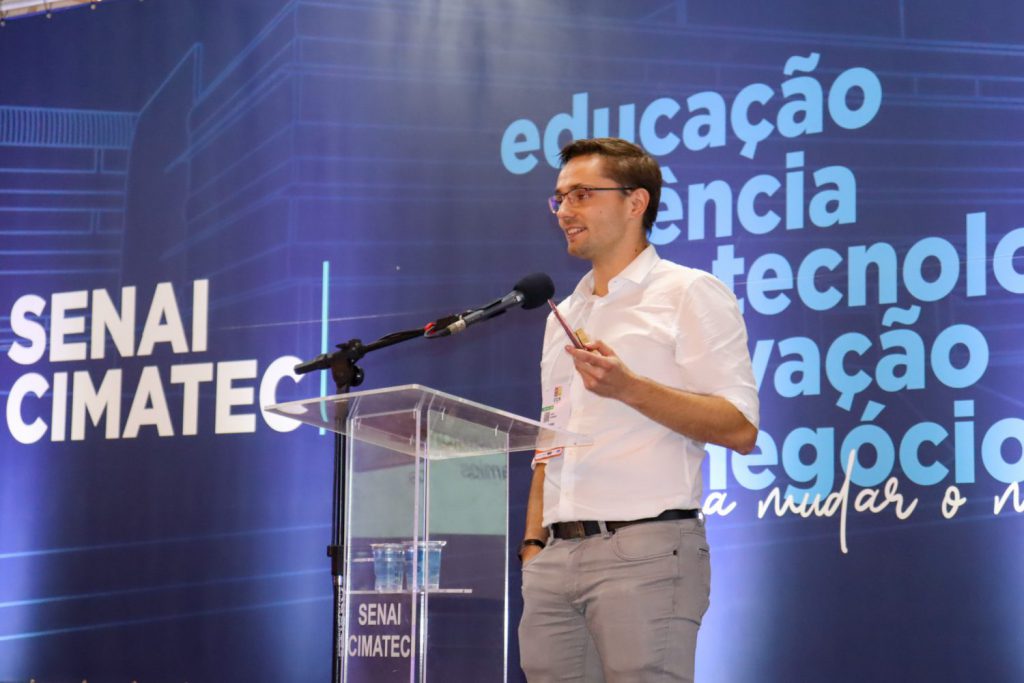
Foto: Divulgação/CSS
O físico Ricardo Martínez-García é um dos dois ganhadores do Prêmio Científico Júnior 2023 da Sociedade de Sistemas Complexos (CSS). A CSS concede esse prêmio a jovens investigadores que tenham alcançado resultados notáveis na sua busca pela compreensão de sistemas complexos. O anúncio foi feito em 20 de outubro durante a conferência anual da CSS, o maior e mais importante encontro internacional do mundo para a comunidade de pesquisa de sistemas complexos. Martínez-García atualmente lidera um Grupo de Jovens Pesquisadores no Centro para Compreensão de Sistemas Avançados (CASUS) em Helmholtz-Zentrum Dresden-Rossendorf (HZDR, ambos na Alemanha) e é pesquisador associado no Instituto Sul-Americano para Pesquisa Fundamental (ICTP-SAIFR) e no Instituto de Física Teórica da Universidade Estadual Paulista (IFT-Unesp).
O que têm em comum o tráfego de veículos, o cérebro, a sociedade humana e o microbioma? Todos esses são exemplos de sistemas complexos formados por muitos componentes interagindo entre si de maneiras muito intricadas. Como resultado destas interações, tais sistemas exibem frequentemente novas propriedades emergentes que são muito diferentes das propriedades combinadas das partes individuais que os constituem. A pesquisa em sistemas complexos constrói pontes entre domínios científicos tradicionais.
Essa é também uma característica distinta do trabalho de Martínez-García, que estuda uma variedade de sistemas, desde comunidades microbianas, como biofilmes bacterianos, até ecossistemas áridos e semiáridos como as estepes. Através dessa variedade de sistemas, sua investigação concentrou-se na compreensão de como diferentes organismos, sejam espécies de plantas numa estepe ou bactérias num biofilme, interagem entre si e como essas interações impactam o funcionamento do sistema como um todo. Ao estudar todos esses exemplos utilizando uma abordagem de sistemas complexos, a investigação de Martínez-García visa compreender até que ponto os diferentes sistemas ecológicos são governados por um conjunto mínimo de regras, o que melhorará a nossa capacidade de os manipular e, esperançosamente, de os conservar.
Comitê de Seleção destaca o trabalho de Martínez-García sobre dinâmica organizacional
A Sociedade de Sistemas Complexos promove a investigação de sistemas complexos desde que se tornou uma sociedade internacional em 2006. O seu Prémio Científico Júnior visa reconhecer o excelente desempenho científico de jovens investigadores nos 10 anos após a defesa do doutoramento. É atribuído uma vez por ano a um máximo de dois jovens investigadores. A decisão é tomada por uma Comissão de Seleção nomeada pela Comissão Executiva da CSS. Na declaração de premiação, o Comitê de Seleção fez referência ao trabalho teórico de Martínez-García sobre dinâmicas coletivas evolutivas, organizacionais e ecológicas.
Martínez-García afirma que seu interesse por sistemas ecológicos complexos começou por causa de seu amor por estar ao ar livre e observar como as coisas acontecem na natureza: “Quando aprendi no Ensino Médio que era possível usar a Física e a Matemática para entender as regras por trás desses fenômenos naturais pelos quais estava apaixonado, ficou evidente que eu queria explorar mais profundamente essa interface.”
Ele também destaca como as interações com colegas cientistas ajudaram a moldar seu programa de pesquisa ao longo dos anos: “Uma das partes que mais gosto no meu trabalho é conversar com pessoas com diferentes formações científicas e aprender como elas pensam sobre questões e problemas que eu também acho interessante.”
“Um trabalho fantástico”
O pesquisador acrescenta que o prêmio o incentiva a continuar trabalhando arduamente, um conselho que dá aos estudantes interessados em escolher a ciência como profissão – que é tão emocionante quanto desafiadora: “É muito gratificante ver que os seus pares reconhecem a relevância do seu trabalho e o consideram merecedor desse reconhecimento. Acredito que muitas vezes nos concentramos demais nas rejeições e nas desvantagens de seguir uma carreira científica, embora seja, em geral, um trabalho fantástico.”
Martínez-García obteve seu doutorado em Física Estatística e Sistemas Complexos no Instituto de Física Interdisciplinar e Sistemas Complexos (IFISC), um centro de pesquisa conjunto do Conselho Nacional de Pesquisa Espanhol (CSIC) e da Universidade das Ilhas Baleares (Espanha). Sua tese combinou abordagens da Física e das Ciências da Computação para investigar diferentes problemas ecológicos, como o movimento dos animais e o surgimento de padrões regulares de vegetação em terras áridas. Ele então recebeu uma bolsa da Fundação de Pesquisa em Ciências da Vida para concluir um pós-doutorado em Ecologia e Biologia Evolutiva na Universidade de Princeton (EUA), onde investigou a interação entre a ecologia, a evolução e a multicelularidade auto-organizada das comunidades microbianas. Antes de ingressar no CASUS, Martínez-García trabalhou no ICTP-SAIFR / IFT-Unesp. Lá, foi Jovem Pesquisador da Fapesp e Professor Assistente na área de Física Biológica.
Um segundo Prêmio Científico Júnior foi este ano para Giulia Menichetti (Harvard Medical School & Brigham and Women’s Hospital, Boston, EUA), que investiga toda a complexidade química da dieta humana e desenvolve ferramentas quantitativas para revelar o impacto destes produtos químicos na nossa saúde. Por último, o Comitê de Seleção concedeu o Prêmio Sênior, o mais prestigiado reconhecimento do CSS, este ano a Melanie Mitchell (Instituto Santa Fé, EUA) referindo-se, entre outras, às suas contribuições para a computação adaptativa, a computação de inspiração biológica e a aprendizagem automática.
Sobre o Centro para Compreensão de Sistemas Avançados
O CASUS foi fundado em 2019 em Görlitz (Alemanha) e realiza pesquisas interdisciplinares de sistemas com uso intensivo de dados em disciplinas tão diversas como pesquisa de sistemas terrestres, biologia de sistemas ou pesquisa de materiais. O objetivo do CASUS é criar imagens digitais de sistemas complexos de fidelidade sem precedentes à realidade com métodos inovadores de matemática, pesquisa de sistemas teóricos, simulações, bem como dados e Ciência da Computação para dar respostas a questões sociais urgentes. Os parceiros fundadores do CASUS são o Helmholtz-Zentrum Dresden-Rossendorf (HZDR), o Centro Helmholtz de Pesquisa Ambiental em Leipzig (UFZ), o Instituto Max Planck de Biologia Celular Molecular e Genética em Dresden (MPI-CBG), a Universidade Técnica de Dresden (TUD) e a Universidade de Wrocław (UWr). O CASUS, gerido como um instituto do HZDR, é financiado pelo Ministério Federal Alemão de Educação e Pesquisa (BMBF) e pelo Ministério da Ciência, Cultura e Turismo do Estado da Saxônia (SMWK). www.casus.science
Sobre o ICTP-SAIFR
O Instituto Sul-Americano para Pesquisa Fundamental (ICTP-SAIFR) é um centro internacional criado na cidade de São Paulo por meio de uma colaboração entre o Centro Internacional de Física Teórica (ICTP) em Trieste (Itália), o IFT-Unesp e a Fapesp. Suas atividades incluem pesquisa em Física Teórica e suas aplicações, bem como treinamento para alunos de pós-graduação. O ICTP-SAIFR também promove divulgação científica e ações de extensão junto a professores e estudantes de Ensino Médio e público geral. Mais informações estão disponíveis no site ictp-saifr.org.
Sobre o IFT-Unesp
O Instituto de Física Teórica (IFT) é um departamento de pós-graduação em Física da Unesp localizado no centro de São Paulo. O IFT-Unesp foi criado em 1951 como uma fundação privada e incorporado à Unesp em 1987. Possui aproximadamente 20 professores e 70 alunos de pós-graduação em Física, e recebe nota máxima da Coordenação de Aperfeiçoamento de Pessoal de Nível Superior (Capes) desde 2011.
Continue Reading | Comments Off on Ricardo Martínez-García ganha prêmio internacional de carreira em pesquisa de sistemas complexos
Ricardo Martínez-García wins international career award in complex systems’ research
Junior physicist from CASUS and SAIFR recognized for his work in statistical physics to better understand the dynamics of complex living systems

Credit: Courtesy of CSS
Physicist Dr. Ricardo Martínez-García is one of the two recipients of the 2023 Junior Scientific Award of the Complex Systems Society (CSS). The CSS grants this prize to young researchers who have achieved outstanding results in their pursuit to understand complex systems. The announcement was made on October 20 during the annual CSS conference, the world’s largest and most important international meeting for the complex systems research community. Martínez-García currently heads a Young Investigator Group at the Center for Advanced Systems Understanding (CASUS) at Helmholtz-Zentrum Dresden-Rossendorf (HZDR, both Germany) and is an associated researcher at the South American Institute for Fundamental Research in São Paulo (ICTP-SAIFR) and at the Institute for Theoretical Physics of São Paulo State University (IFT-UNESP, all Brazil).
What have vehicle traffic, the brain, human society and the microbiome in common? All these are examples of complex systems that are formed by many components interacting with each other in very intricate ways. As a result of these interactions, such systems often exhibit new emergent properties that are very different from the combined properties of the individual parts that constitute them. Research on complex systems builds bridges between traditional scientific domains.
This is also a distinct trait of Martínez-García’s work as he studies a variety of systems, from microbial communities, such as bacterial biofilms, to arid and semi-arid ecosystems like steppes. Across this variety of systems, his research has focused on understanding how different organisms, whether they are plant species in a steppe or bacteria in a biofilm, interact with each other and how these interactions impact the functioning of the system as a whole. By studying all these many examples using a complex-systems approach, Martínez-García’s research aims to understand to which extent different ecological systems are governed by a minimum set of rules, which will improve our ability to manipulate and hopefully conserve them.
Selection Committee highlights Martínez-García’s work on organizational dynamics
The Complex Systems Society promotes complex systems research since becoming an international society in 2006. Its Junior Scientific Award is aimed at recognizing excellent scientific record of young researchers within 10 years of the PhD defense. It is awarded once a year to a maximum of two young researchers. The decision is made by a Selection Committee appointed by the Executive Committee of the CSS. In its award statement, the Selection Committee referenced Martínez-García’s theoretical work on evolutionary, organizational, and ecological collective dynamics.
Martínez-García states his interest in complex ecological systems started because of his love for being outdoors and observing how things happen in nature: “When I learned in high school that it was possible to use physics and mathematics to understand the rules behind these natural phenomena I was passionate about, it became evident that I wanted to explore this interface more deeply.”
He also highlights how interactions with fellow scientists aided to shape his research program over the years: “One of the parts that I enjoy the most about my work is talking to people with different scientific backgrounds and learning how they think about questions and problems that I also find interesting.”
“A fantastic job”
The researcher adds that the award encourages him to continue working hard, a piece of advice he extends to students interested in choosing science as a profession – one that is as exciting as challenging: “It is very rewarding to see that your peers recognize the relevance of your work and consider it worth this recognition. I believe we very often focus too much on rejections and the downsides of pursuing a scientific career, even though it is, in general, a fantastic job.”
Martínez-García obtained his PhD in statistical Physics and Complex Systems at the Institute for Cross-Disciplinary Physics and Complex Systems (IFISC), a joint research center of the Spanish National Research Council (CSIC) and the University of the Balearic Islands (Spain). His thesis combined approaches from physics and computer sciences to investigate different ecological problems, such as animal movement and the emergence of regular vegetation patterns in drylands. He then received a Life Science Research Foundation fellowship to complete a postdoc in ecology and evolutionary biology at Princeton University (USA), where he investigated the interplay between the ecology, evolution and self-organized multicellularity of microbial communities. Before joining CASUS, Martínez-García worked at the ICTP-SAIFR based at the Institute for Theoretical Physics (IFT) of São Paulo State University (UNESP). There he was a FAPESP (São Paulo Research Foundation) Young Investigator and an Assistant Professor in the field of biological physics.
A second Junior Scientific Award went this year to Giulia Menichetti (Harvard Medical School & Brigham and Women’s Hospital, Boston, USA), who researches the full chemical complexity of the human diet and develops quantitative tools to unveil the impact of these chemicals on our health. Finally, the Selection Committee granted the Senior Award, the most prestigious recognition of the CSS, this year to Melanie Mitchell (Santa Fe Institute, USA) referring, among others, to her contributions to adaptive computation, biologically inspired computing and machine learning.
About the Center for Advanced Systems Understanding
CASUS was founded 2019 in Görlitz/Germany and pursues data-intensive interdisciplinary systems research in such diverse disciplines as earth system research, systems biology or materials research. The goal of CASUS is to create digital images of complex systems of unprecedented fidelity to reality with innovative methods from mathematics, theoretical systems research, simulations as well as data and computer science to give answers to urgent societal questions. The founding partners of CASUS are the Helmholtz-Zentrum Dresden-Rossendorf (HZDR), the Helmholtz Centre for Environmental Research in Leipzig (UFZ), the Max Planck Institute of Molecular Cell Biology and Genetics in Dresden (MPI-CBG), the Technical University of Dresden (TUD) and the University of Wrocław (UWr). CASUS, managed as an institute of the HZDR, is funded by the German Federal Ministry of Education and Research (BMBF) and the Saxon State Ministry for Science, Culture and Tourism (SMWK). www.casus.science
About ICTP-SAIFR
The South American Institute for Fundamental Research (ICTP-SAIFR) is an international center created in the city of São Paulo (Brazil) through a collaboration between the International Centre for Theoretical Physics (ICTP) in Trieste (Italy), the Institute for Theoretical Physics (IFT) of São Paulo State University (UNESP), and the São Paulo state funding agency FAPESP. Its activities include research in Theoretical Physics and its applications, as well as training for postgraduate students. ICTP-SAIFR also promotes outreach actions with high school teachers and students and the general public. More information is available at ictp-saifr.org.
About IFT-UNESP
The Institute for Theoretical Physics (IFT) is a graduate physics department of São Paulo State University (UNESP) located in the center of São Paulo. IFT-UNESP was founded in 1951 as a private foundation and incorporated into UNESP in 1987. It has approximately 20 professors and 70 graduate students in physics, and has received the top score from the national funding agency since 2011.
Continue Reading | Comments Off on Ricardo Martínez-García wins international career award in complex systems’ research
“Alça de bota”: um “truque” da Física para questões muito complexas
Técnica do bootstrap, que permite obter resultados a partir de princípios gerais, tem sido explorada por colaboração global de pesquisadores

Parte do calçado que deu nome ao conceito remete a processos que se desenvolvem sem influência exterior (Foto: Ivan Bolshakov/Unsplash)
Em inglês, há uma expressão que pode ser traduzida como “puxar-se pelas alças das próprias botas”, utilizada para situações difíceis que alguém precisa resolver sozinho sem ajuda externa. Essa expressão levou ao surgimento do termo bootstrap (literalmente “alça de bota”), usado em vários campos do conhecimento para se referir a processos que podem ser desenvolvidos dispensando a influência do exterior.
A filosofia por trás desse conceito também tem sido aplicada em alguns dos mais difíceis problemas que a Física enfrenta na atualidade, relacionados ao chamado acoplamento forte. Esse foi o tema de um workshop promovido pelo ICTP-SAIFR, centro internacional sediado no Instituto de Física Teórica (IFT) da Unesp, em junho e julho deste ano, com convidados e participantes de diversos países.
Nos sistemas fracamente acoplados, como gases ou a luz, as partículas não colidem ou interagem muito entre si e, portanto, estão mais livres. Estudá-los é relativamente simples, pois é possível usar um método conhecido como teoria de perturbações, que permite “quebrar” um problema em problemas menores. Isso porque é fácil separar as partes constituintes desses sistemas, ou seja, os “bloquinhos” dos quais são feitos.
Os sistemas fortemente acoplados, por sua vez, são muito mais difíceis de analisar. Nesses sistemas, muitas partículas interagem entre si ao mesmo tempo. Por causa disso, é como se suas partes constituintes formassem uma sopa, “mas tão misturada que você não consegue sequer separá-las. E nessa situação começa até a se tornar ambíguo o que é feito do quê”, aponta o físico russo Slava Rychkov, professor do Instituto de Estudos Científicos Avançados da França. Em casos assim, a teoria de perturbações não funciona e é preciso adotar outros modelos, como as teorias conformes. É aí que o bootstrap entra, ao oferecer uma nova abordagem para o estudo dessas teorias, baseada em princípios gerais.
Teorias conformes são especialmente úteis para descrever pontos críticos: por exemplo, transições de fase – quando água em estado líquido vira vapor ou quando um imã deixa de ser magnético. Uma das características desse tipo de fenômeno é a invariância de escala. Em outras palavras, não importa se você observa o sistema mais de perto ou mais de longe: ele parece se comportar da mesma forma.
O físico português Pedro Vieira, professor em conjunto do ICTP-SAIFR/IFT-Unesp e do Instituto Perimeter (Canadá), explica que investigações envolvendo teorias conformes são um desafio matemático: “muitas vezes, fazer as contas da forma tradicional é impensável porque são muitas variáveis”, com cálculos que exigem grande poder computacional. “A ideia do bootstrap é tentar chegar direto aos resultados sem passar pelas contas.”
Essa nova forma de pensar, que chega a ser contraintuitiva, coloca o pesquisador no papel de um navegador, analogia usada por Slava Rychkov. O “mar” seria um espaço de parâmetros, ou seja, todos os possíveis valores dentro de um modelo matemático específico. Ao resolver equações, segundo Rychkov, certas regiões surgem dentro desse “mar”, como se fossem ilhas, arquipélagos e continentes. Tais regiões podem conter teorias interessantes, a serem descobertas com o auxílio de técnicas analíticas e numéricas.
Pedro Vieira afirma que essa exploração de teorias, em busca de definir o que é possível e o que é impossível, leva os físicos a encontrar valores que, na sequência, é viável examinar de forma mais convencional: “quando já se sabe o resultado, é mais fácil voltar para os métodos tradicionais e tentar desenvolver novas armas para estudar esses modelos”. Outra forma de verificá-los, quando isso é exequível, é por meio de experimentos em aceleradores de partículas.
Colaboração internacional
Os mais recentes avanços no uso do bootstrap na Física têm sido promissores, estendendo-se para áreas variadas, que vão da teoria das cordas à matéria condensada, passando por holografia, buracos negros e até propostas para além do Modelo Padrão (o mais completo modelo até o momento para descrever a matéria visível). Por esse motivo, a Fundação Simons, uma tradicional financiadora internacional de ciência de ponta, mantém uma colaboração com dezenas de pesquisadores ao redor do mundo dedicados ao tema, incluindo Slava Rychkov e Pedro Vieira, além de pós-doutorandos e estudantes de doutorado.
De acordo com o físico português João Penedones, da Escola Politécnica Federal de Lausana (Suíça) e um dos pesquisadores principais da colaboração, a iniciativa ajudou a criar uma comunidade em torno do conceito, que se mantém ativa participando de reuniões periódicas e, uma vez por ano, se encontrando em uma grande conferência presencial, com duração de três a quatro semanas – a deste ano foi o workshop realizado pelo ICTP-SAIFR. “Dessa forma, nós continuamos colaborando juntos. Algumas pessoas exploram áreas ligeiramente diferentes, mas nós sempre nos reunimos para manter essa motivação e esse ímpeto”, diz Penedones.
Para Rychkov, que é diretor adjunto da colaboração, o financiamento oferecido pela Fundação Simons – aplicado em bolsas e serviços de tecnologia, necessários para rodar os algoritmos responsáveis pelos cálculos das pesquisas – é secundário diante do “efeito de amplificação” proporcionado pelos encontros regulares, que envolvem especialmente físicos em início de carreira: “Acho que isso foi maior do que seria se cada um de nós apenas recebesse esse dinheiro para fazer o que quiser sem questionamentos. Não seria possível fazer toda essa boa ciência que fizemos.”
Felipe Saldanha é jornalista de ciência do ICTP-SAIFR com bolsa da Fapesp.
Agradecimento: Francesco Aprile, da Universidade Complutense de Madri (Espanha)
Continue Reading | Comments Off on “Alça de bota”: um “truque” da Física para questões muito complexas
